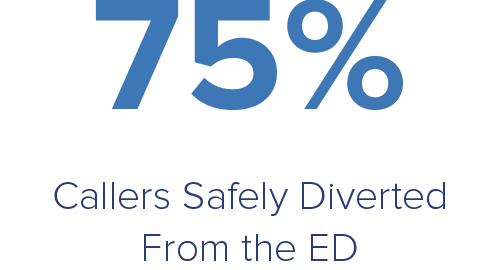The COVID-19 pandemic exposed challenges for patients accessing healthcare in BC. Many patients were unsure whether their symptoms warranted urgent access to care via the emergency department (ED). During the pandemic, visits to EDs decreased due to patients’ fear of infection and concern over the appropriateness of an ED visit. Patients needed an alternative way to access care and health information. Call volume to the HealthLink BC 8-1-1 line increased sevenfold, and the service was overwhelmed.
What is HEiDi?
B.C.’s health information telephone service (8-1-1) is a free-of-charge provincial health information and advice phone line. 8-1-1 connects callers with registered nurses who help them decide whether to visit an emergency department, a primary care clinic or manage their health concerns at home. HEiDi (HealthLink BC Emergency iDoctor-in-assistance) is a new addition to the 8-1-1 service. HEiDi physicians partner with 8-1-1 nurses to support callers via videoconferencing.
What Are We Studying?
A recently published study describes the development and 4-month results of the HEiDi service. It covers the period from Apr. 6 to Aug. 2, 2020. All 8-1-1 callers categorized as “seek care within 24 hours” by registered nurses were eligible for referral to HEiDi. HEiDi physicians connected with callers via videoconference, assessed their health complaints, provided advice and suggested care disposition. This study shares the collected demographic characteristics, health concerns and dispositions determined by the virtual physician.

Dr. Kendall Ho, lead author and EM Network RTVS Lead.
The study was led by the EM Network Real-Time Virtual Support Lead, Dr. Kendall Ho. It was co-authored by EM Network Members Riyad Abu-Laban, Frank Scheuermeyer, Eric Grafstein, Jim Christenson, with Helen Novak Lauscher, Kurtis Stewart, and Sandra Sundhu.
Dr. Ho was inspired to develop and study HEiDi to help patients get the care they need, while safely reducing non-urgent visits to the ED. “In my clinical experience, many patients go to the emergency department (ED) reluctantly for health advice because of their need for just-in-time information, while others don’t visit the ED even when they have major health problems requiring urgent attention,” says Dr. Ho.
“HEiDi physicians can give patients just-in-time information, and ensure appropriate triage to health services. This discerning triage decreases ED wait times and preserves the capacity of the ED for those patients with true emergencies.”
This discerning triage decreases ED wait times and preserves the capacity of the ED for those patients with true emergencies.
What Did We Find?
Call Volume and Demographics
From Apr. 6 to Aug. 2, 2020, HEiDi virtual physicians provided 7,687 consultations. 63% of callers were female and 37% were male.
Common Health Concerns
Patients receiving care from HEiDi virtual physicians expressed concerns related to gastroenterology (17%), respiratory (11% ), and dermatology (11% ).
Virtual Physician Triage Decisions
Of the patients seen in the study, HEiDi Virtual Physicians advised:
- 34% to attempt home treatment
- 38% to contact a primary care physician within one week
- 15% to attend an emergency department immediately
- 7% to attend their primary provider immediately
Patient Safety
Virtual physicians advised nearly 75% of patients away from in-person emergency or clinic visits. HEiDi virtual physicians provide an effective complement to a provincial health telephone system.
“Dr. Ho has shown that this use of Real-Time Virtual Support has the effect of reducing unnecessary emergency visits but in other circumstances of reinforcing the need for a caller to get to an ED quickly when that is appropriate. As an integrated part of the public health care system, it can improve efficiency, safety and patient satisfaction when patients are in need of urgent advice”, says Dr. Jim Christenson, Executive Medical Director, EM Network.
Dr. Ho has shown that this use of Real-Time Virtual Support has the effect of reducing unnecessary emergency visits but in other circumstances of reinforcing the need for a caller to get to an ED quickly when that is appropriate.
Implications for the Future
Going forward, Dr. Ho aims to link 8-1-1 data with emergency department and practitioner data. “I’d like to better understand the patient’s journey after using the HEiDi service, particularly in terms of visits to the ED, follow-up with family doctors, and overall health outcomes,” he says. “This verification step will prove HEiDi’s ability to successfully support patient care, and demonstrate the service’s cost-effectiveness in support of the optimal utilization of primary and acute care services.”
Learn More
- CMAJ Open: Integration of virtual physician visits into a provincial 8-1-1 health information telephone service during the COVID-19 pandemic: a descriptive study of HealthLink BC Emergency iDoctor-in-assistance (HEiDi)
- HealthLink BC: Virtual Physicians
- UBC Department of Emergency Medicine: UBC Emergency Medicine Researchers Optimize Delivery of COVID-19 Telehealth Care
- B.C. Emergency Medicine Network: HealthLink BC Emergency iDoctor-in-assistance (HEiDi)
- UBC Department of Emergency Medicine: Digital Emergency Medicine Unit
COMMENTS (0)
Add public comment…




POST COMMENT
We welcome your contribution! If you are a member, log in here. If not, you can still submit a comment but we just need some information.